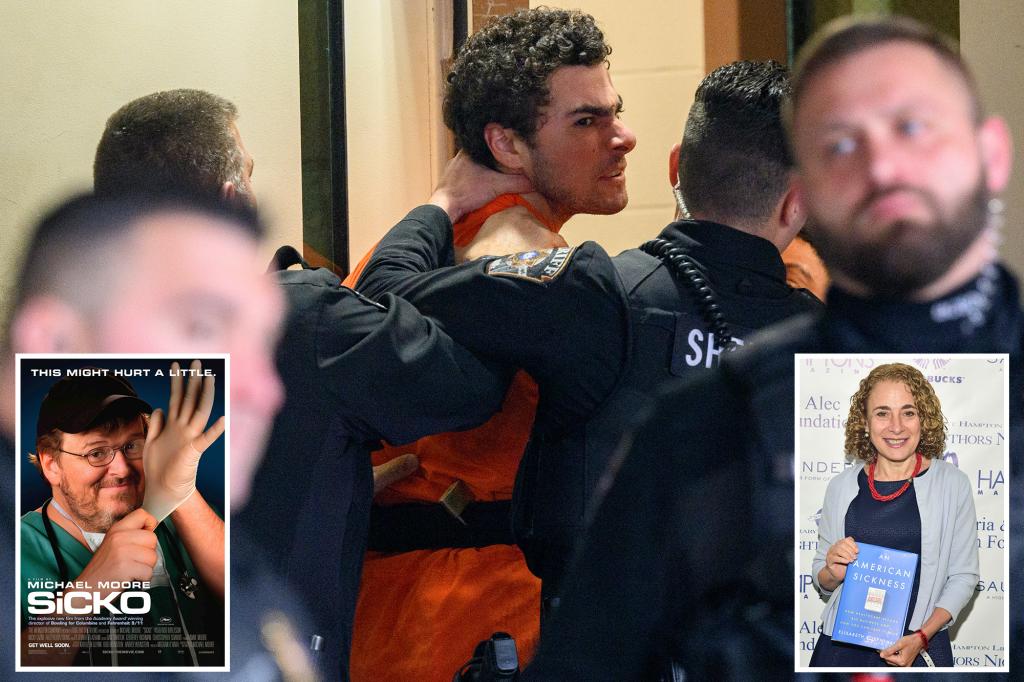Luigi Mangione, the alleged killer of UnitedHealthcare CEO Brian Thompson, reportedly cited filmmaker Michael Moore and former New York Times reporter Elisabeth Rosenthal in his manifesto as individuals who have exposed the corruption and greed within the American healthcare system. While Mangione acknowledged he wasn’t the most qualified person to present a comprehensive argument against the industry’s practices, he believed their work had already shed light on these systemic issues decades ago, yet the problems persisted. This apparent influence from Moore and Rosenthal provides a crucial context for understanding Mangione’s motivations and the deep-seated frustration that allegedly culminated in Thompson’s death.
Investigators believe Mangione specifically referenced Moore’s 2007 documentary “Sicko” and Rosenthal’s 2017 book “An American Sickness: How Healthcare Became Big Business and How You Can Take it Back.” “Sicko” launched a sharp critique of the American health insurance industry, juxtaposing its shortcomings with the more equitable systems of other developed nations. The film highlighted the financial burdens, bureaucratic hurdles, and denial of care that many Americans face under the current system, arguing that profit motives often supersede patient well-being. Moore’s documentary resonated with a wide audience, sparking national conversations about healthcare reform and contributing to the growing public dissatisfaction with the status quo.
Rosenthal’s “An American Sickness” delves into the intricate web of profit-driven mechanisms that have transformed American healthcare. The book argues that the pursuit of profit has created a complex and opaque system where patients are often left bewildered, frustrated, and burdened with exorbitant costs while receiving subpar care. Rosenthal meticulously dissects various aspects of the industry, from pharmaceutical pricing to hospital billing practices, exposing the ways in which profit maximization has become deeply entrenched in the system. The book, marketed as a “frontline defense” against a healthcare system that prioritizes profits over patient well-being, likely resonated with Mangione’s own perceived grievances.
Mangione’s citation of Moore and Rosenthal suggests his alleged actions stemmed from a profound disillusionment with the American healthcare system. He appears to have viewed the industry as inherently corrupt and exploitative, a system where corporate greed trumps the needs of patients. This perspective aligns with the central arguments presented in both “Sicko” and “An American Sickness.” Both works highlight the systemic issues that contribute to high costs, unequal access, and questionable practices within the industry, portraying a system in dire need of reform. Mangione’s manifesto, therefore, can be interpreted as a desperate cry against a system he believed to be fundamentally broken.
The influence of Moore and Rosenthal on Mangione underscores the broader societal impact of their work. While their primary aim was to expose the flaws within the American healthcare system and advocate for change, their critiques appear to have resonated deeply with individuals like Mangione, who felt personally affected by the system’s shortcomings. This incident raises complex questions about the role of investigative journalism and documentary filmmaking in shaping public perception and potentially influencing individual actions. While these works aim to shed light on critical issues and ignite public discourse, the potential for such critiques to be interpreted and acted upon in extreme ways remains a complex and troubling consideration.
The case of Luigi Mangione serves as a stark reminder of the deep-seated frustrations and anger that many Americans harbor towards the healthcare system. While the vast majority express their discontent through legitimate channels like advocacy and voting, Mangione’s alleged actions represent a tragic extreme. His purported embrace of Moore and Rosenthal’s critiques suggests a desperate search for validation and a sense of shared outrage. This incident underscores the urgent need for meaningful healthcare reform that addresses the systemic issues plaguing the industry and restores public trust in a system designed to care for the well-being of all citizens. It also highlights the complex relationship between media critiques of societal institutions and their potential impact on individual perceptions and actions.










